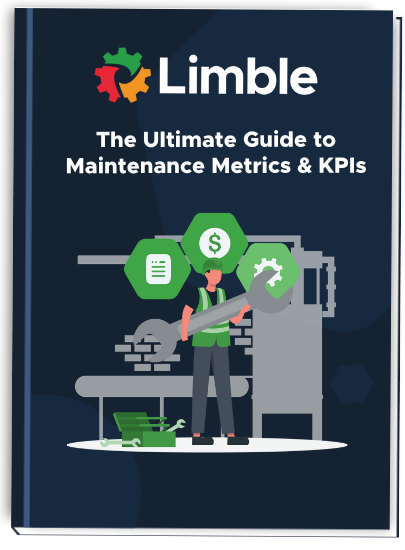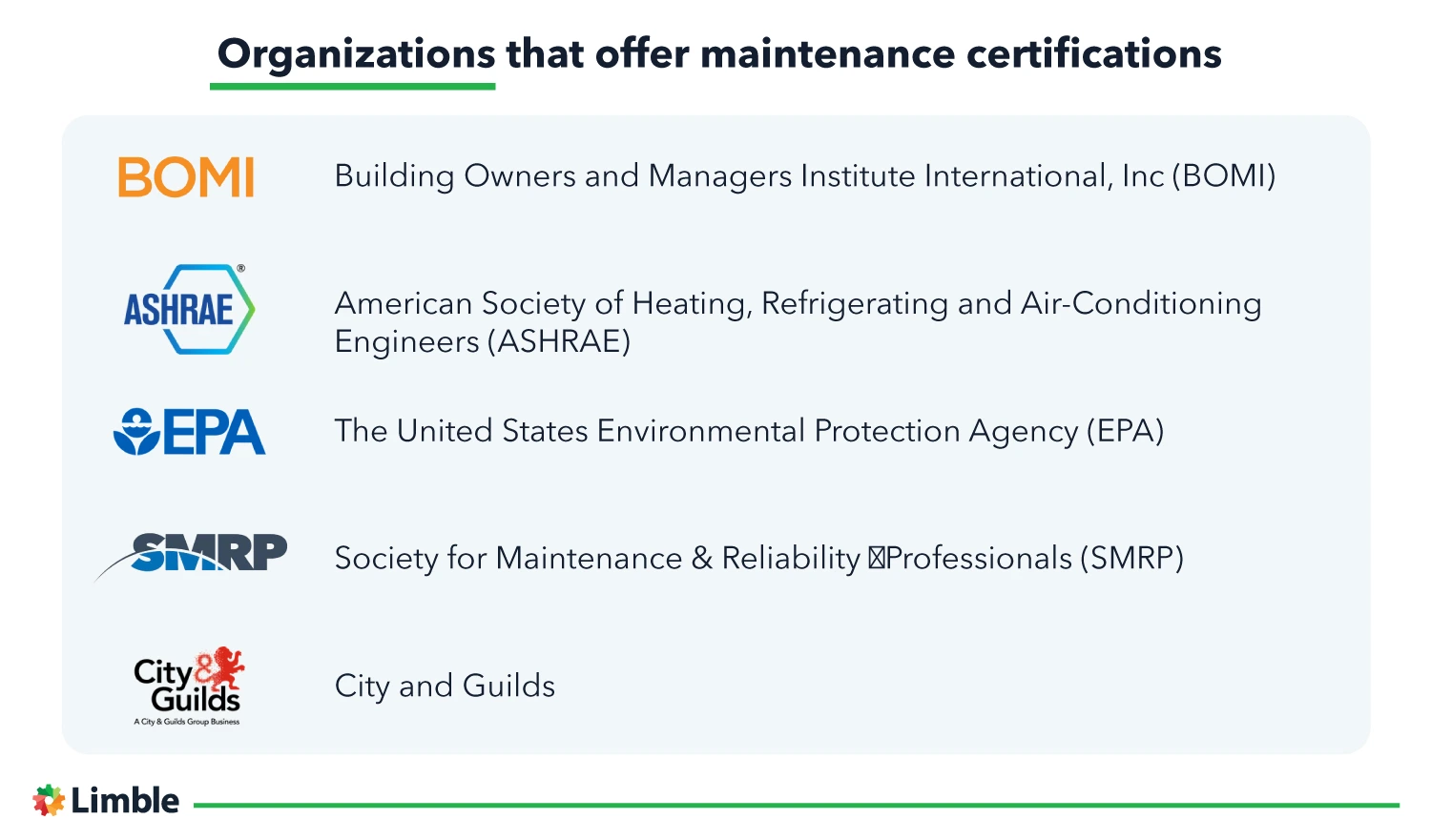As a maintenance professional, you’ve probably heard that earning maintenance certifications can help you get a better job. However, you might have also heard people complain that after taking certain certifications, it did nothing to help them land their dream job. With what seems like hundreds of certifications out there to choose from, you may be stuck and unsure of how to proceed.
Luckily, we’ve done the work for you by painstakingly searching for the certifications (both at the technician and supervisory level) that give you the best shot at growing your professional career.
Before we list those, let’s start with some general info you need to know.
Why do you need maintenance certifications?
In a nutshell, a certification is a recognized credential that you earn. It verifies your legitimacy and competence to perform a certain job. Regardless of the industry, certifications are typically displayed as a document stating that as a professional, you’ve been trained and educated, and are now prepared to meet a specific set of criteria for your role.
Maintenance certifications can help you advance faster in your career, especially if you intend to focus on highly-specialized areas of maintenance management like HVAC, automobile, aviation, medical equipment, or industrial maintenance.
While it’s true that not all certifications are created equal, they do provide potential employers with the assurance of professional competence alongside your educational qualifications or work experience.
Just like any continuing form of maintenance education and training, certification programs require an investment of time and resources. However, they come with indisputable benefits:
- They help provide recognition for your specialized knowledge or skill set, which can give you a significant edge for landing competitive jobs.
- They can help increase your paycheck.
- They help to establish your professional credibility and show potential employers your commitment to personal growth.
- Recruiters often ask for specific certifications. Check platforms like Indeed, Reed UK, and Glassdoor to see what they are looking for.
The maintenance certification process
What should you expect during the certification process?
Starting a maintenance certification is relatively straightforward. Expect to fill out an online application and pay a fee before your registration is considered successful. This part of the process will often be completed for you if the certification is paid for by your firm.
Most of the maintenance certification providers don’t demand specific educational qualifications before registration, especially at the technician level. Still, we recommend that you have a high school diploma or GED because recruiters and potential employers would typically expect that. If you don’t have either but you can provide evidence of relevant experience, feel free to apply as well.
Maintenance certification classes
No matter the kind of certification you seek, the credentials are only awarded after you’ve passed the relevant assessments – obviously.
These days, the majority of certifying bodies allow you to register and pay your application fees online. After that, you can access more resources (such as these training materials provided by the SMRP). An advantage of these materials is that it is an ideal arrangement if you prefer on-demand training at your own pace.
In addition to the training content, you’ll get more information about the testing process. Some exams are held online, while others are administered via paper (or in a digital format) at approved testing locations.
Furthermore, there are several institutions and independent training centers that offer virtual classes to help people prepare for many of these exams. Before committing to any training center, it’s advisable that you do some additional digging to find out their track record and if
the provider is qualified or recognized – and if so, by whom?
After the assessment
Once you’ve passed the required exams and earned the certification, you might be given a designation (usually in the form of initials) that you can use after your name. This serves to distinguish you as a certified professional from your uncertified peers.
For example, certified maintenance managers may include the abbreviation C.M.M. after their names on a resume or in a professional forum – like Linkedin – if they choose to.
However, due to the continuous innovations, improvements, and changes in maintenance, to retain the validity of your certification, most certifying bodies will require that you renew your credentials through a periodic recertification exercise. This usually happens after a period of three to five years depending on the particular certification.
Free Ultimate Guide to Maintenance Metrics
Our new guide to maintenance metrics includes formulas for making helpful calculations, tips for introducing a data-driven maintenance strategy, and more.

Major organizations that offer maintenance certifications
You don’t want to waste time and money on certifications that do nothing for your career. Below is a shortlist of recognized bodies that offer widely recognized maintenance certifications. Except for the City and Guilds which is UK- based, the others are located in the USA with recognized affiliations in the UK and Canada:
- Building Owners and Managers Institute International, Inc (BOMI)
- American Society of Heating, Refrigerating and Air-Conditioning Engineers (ASHRAE)
- The United States Environmental Protection Agency (EPA)
- Society for Maintenance & Reliability Professionals (SMRP)
- City and Guilds
Popular technician level maintenance certifications
#1) The Certified Maintenance and Reliability Technician (CMRT) certification by the Society for Maintenance & Reliability Professionals (SMRP) is a popular credential that verifies the competence of maintenance technicians in preventive, predictive maintenance, troubleshooting, and corrective maintenance.
#2) Master Certified Electronics Technician(CET) by ETA International showcases technicians with several years of experience who demonstrate proficiency in many fields of electronics.
#3) EPA HVAC Certification. Section 608 of The US Clean Air Act requires that Technicians who maintain, service, repair, or dispose of refrigerant equipment must have this certification.
#4) Certified Biomedical Equipment Technician (CBET) by (AAMI)
#5) Electrical Technician Certification by the (EETC)
After working directly on equipment and machinery for a while, you might wish to transition into a more managerial or supervisory position within the maintenance team. The next section lists some certifications that can give you the credibility for more responsibilities.
Popular supervisory level maintenance certifications
#1) Certified Maintenance & Reliability Professional (CMRP) is provided by the SMRP. This certification focuses on those handling the managerial aspect of maintenance work. The coursework prepares them for work management, equipment reliability, planning, organization and leadership.
#2) The Building Systems Maintenance Certificate is provided by BOMI (also known as the SMC program. It covers in-depth information on HVAC, water systems, energy control and efficiency, and other building systems maintenance best practices.
#3) Certificate for Apartment Maintenance Technicians (CAMT) is provided by the NAA. Participants are mainly apartment maintenance technicians. The coursework validates their knowledge in several areas, including customer service, HVAC repair, mechanical services, painting, and similar.
#4) Certified Manager of Maintenance (CMM) is provided by the NHCM. For property maintenance managers and supervisors, the CMM credential is designed to train candidates in the various roles they’ll need to play in their occupation.
#5) Project Management Professional (PMP) by the PMI is a globally recognized and highly sought-after certification for aspiring team leaders and project managers. It can help to give you the recognition to handle positions that will grow your career to managerial and executive positions. For truly ambitious maintenance supervisors, a PMP can set you well ahead of your peers.
The maintenance jobs market is wide open
As with any other job, maintenance professionals are encouraged and expected to continuously improve their skills and knowledge.
Be it a new machine, maintenance tool, CMMS software, or NDT testing method, there is always something new to learn. Furthermore, while the maintenance industry is experiencing a labor shortage, companies that offer great working conditions are still highly sought after. Use relevant maintenance certifications on your maintenance resume to stand out and land your dream job.

